WASHINGTON (OSV News) — Nearly 1,000 people joined the procession for the 111th World Day of Migrants and Refugees in the nation’s capital, which had “Migrants, Missionaries of Hope” as its theme. They paused at seven reflection stops, traveling through Northwest on that Sunday, Sept. 28, before concluding the walk at the Cathedral of St. Matthew the Apostle, where Washington Cardinal Robert McElroy celebrated a Mass marking the day.
The procession and reflections were organized by the Archdiocese of Washington and Jesuit Refugee Service/USA. City noise gave way to hymns and testimonies as people carrying sacred images led the walk. Many pilgrims also carried rosaries, fingering the beads in prayer as they moved along the route.
Procession held for World Day of Migrants and Refugees in nation’s capital
Pilgrims lifted the San Damiano Cross and an image of Our Lady of Guadalupe, while symbolic monarch butterflies, mounted on sticks, tucked into hats, or woven into hair, fluttered above the crowd. Monarch butterflies make a 3,000-mile migration from Canada to Mexico, a natural journey often invoked as a reminder of the resilience of migrants and refugees seeking a better life.
“The point of a procession is precisely about bringing the faith and Christ to the public,” Washington Auxiliary Bishop Evelio Menjivar, who walked with the pilgrims, told Catholic Standard, the newspaper of the Archdiocese of Washington. “Who knows, maybe somebody standing by is sad or feeling down, but when they see something like this, they get encouraged.”
Bishop Menjivar said the prayers and songs expressed “the joy of our faith wherever we go,” and he compared the walk to the disciples’ encounter with Jesus Christ on the road to Emmaus.
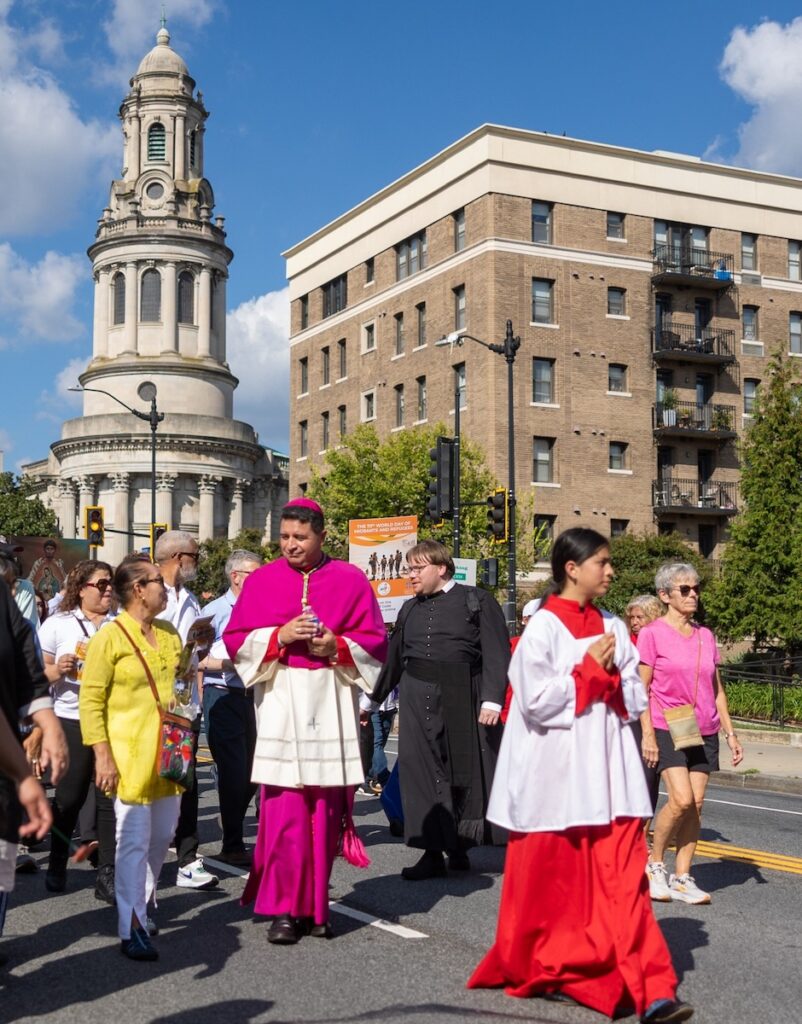
“Jesus walked with them. He walked with those who were sad. And then their hearts started to burn within them,” he said. The bishop, who himself is an immigrant from El Salvador, urged young people to hold fast to their faith. “Choose hope,” he said. “Many people choose anxiety and despair. But faith and hope are gifts, and we have to ask for them.”
At each of the seven stops, participants prayed for migrants and refugees facing different realities: strangers seeking welcome, those in legal struggles, those discerning whether to migrate, people in refugee camps, those detained, advocates at the border, and young people including DREAMers and unaccompanied children. Testimonies were offered by immigrants from Gabon, Burkina Faso, South Korea, Nicaragua, Cameroon, and Guatemala.
Peter K. Kilpatrick, president of The Catholic University of America in Washington, reflected on the Gospel of Matthew.
“‘Truly, I say to you, as you did it to one of the least of these my brethren, you did it to me,'” he said, quoting Matthew 25:45. He said whenever Catholics have the opportunity to demonstrate their faith through corporal or spiritual works of mercy, they are called to do so.
“We are called by God to support others in this way,” Kilpatrick said.
Scarlett Mareno, a ninth grader at Jackson-Reed High School in Washington and a parishioner at the Shrine of the Sacred Heart, served at the front of the procession as an altar server, carrying the San Damiano Cross and a banner that read, “Migrants, Missionaries of Hope.”
Asked by Catholic Standard what she hopes for the future, she said, “For us to be a peaceful people. For us to get along with each other and for racism and hate to be no more.”
Father Timothy Manatt, a Jesuit of the Midwest Province and student of canon law at Catholic University, said the walk carried a quiet but clear message.
“This prayerful procession of pilgrims was, in a way, making a political statement, even though it wasn’t a protest,” Father Manatt said. “What we are called to do is to walk with our migrant and refugee brothers and sisters. What better way to spend a Sunday than taking to the streets in prayer?”
Some who watched from the sidewalks also reacted to the procession. Carlik Brown, a Metrobus operator whose route was paused to let the procession pass, stepped out to take in the scene.
“It was powerful to see so many people united in solidarity and standing up for what they believe,” he told Catholic Standard. “Moments like this remind us that we all belong to something greater than ourselves.”
Mass with Cardinal McElroy for World Day of Migrants and Refugees
The two-and-a-half-hour procession ended with a final blessing on the steps of the Cathedral of St. Matthew, where many participants wiped their brows in the late-afternoon sun before entering the church for the 5:30 p.m. Mass celebrated by Cardinal McElroy.
Cardinal McElroy said Jesus’s Parable of the Good Samaritan should guide Catholics’ response in standing in solidarity with those immigrants facing the government’s mass deportation campaign, regarding them as neighbors just as the Samaritan did to the robbery victim needing help.
In his homily marking the World Day of Migrants and Refugees, Cardinal McElroy said the parable in that day’s Gospel reading raises a central question for Catholics to face as citizens and believers, regarding “whether 10 million men and women and children and families who have lived alongside us for decades should face terror and expulsion: Are they our neighbors?”
“In the Gospel today, Jesus demands that the central perspective we must bring to understanding the moral legitimacy of the campaign of fear and deportation being waged in our country today springs from the bonds of community that have come to tie us together as neighbors with the undocumented, not the question of whether sometime in the past individuals broke a law by entering or remaining in the United States,” Cardinal McElroy said.
Washington’s archbishop then emphasized, “It is this perspective that must form our stance and action as people of faith. As a church we must console and peacefully stand in solidarity with the undocumented men and women whose lives are being upended by the government’s campaign of fear and terror.”
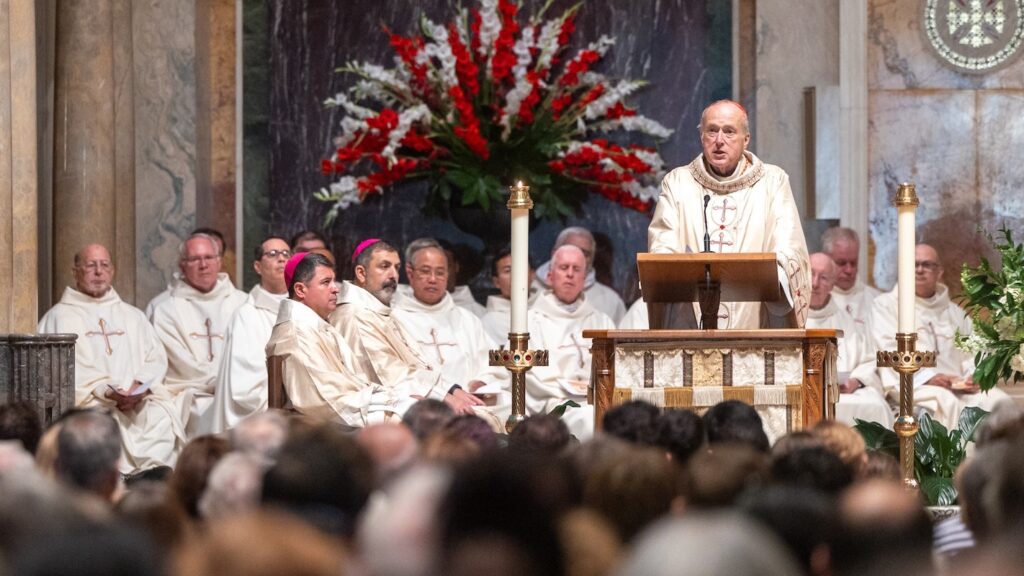
As the Mass opened, Msgr. W. Ronald Jameson, the cathedral rector, welcomed the large congregation, which he noted included ambassadors from different nations and representatives of many organizations.
“In these times of uncertainty and hardship for migrants and refugees in the world, we stand united with our Holy Father and the church across the globe gathering in faith and solidarity to honor their journey and their resilience,” Msgr. Jameson said.
Cardinal McElroy in his opening remarks at the Mass said, “As we are joined together in prayer this day, here in this church, we also remember those who are not here today because they are in fear, those in our undocumented communities who go through their lives now fearful they cannot walk the streets in freedom or in safety or in peace. Let us begin by remembering them in silent prayer and knowing they are here with us.”
The concelebrants at the Mass included Bishop Juan Esposito and Bishop Menjivar, who both serve as auxiliary bishops of Washington, and about 40 archdiocesan and religious order priests.
In his homily, Cardinal McElroy noted that for more than a century, the Mass for the World Day of Migrants has been celebrated “to honor and support migrants and refugees who have come to our nation as part of that stream of men and women from every land who have built up the United States into a great nation.”
But he said this year’s Mass was being held as “we are confronting — both as a nation and as a church — an unprecedented assault upon millions of immigrant men and women and families in our midst.”
“Our first obligation as a church is to embrace in a sustained, unwavering, prophetic and compassionate way the immigrants who are suffering so deeply because of the oppression they are facing,” the cardinal said.
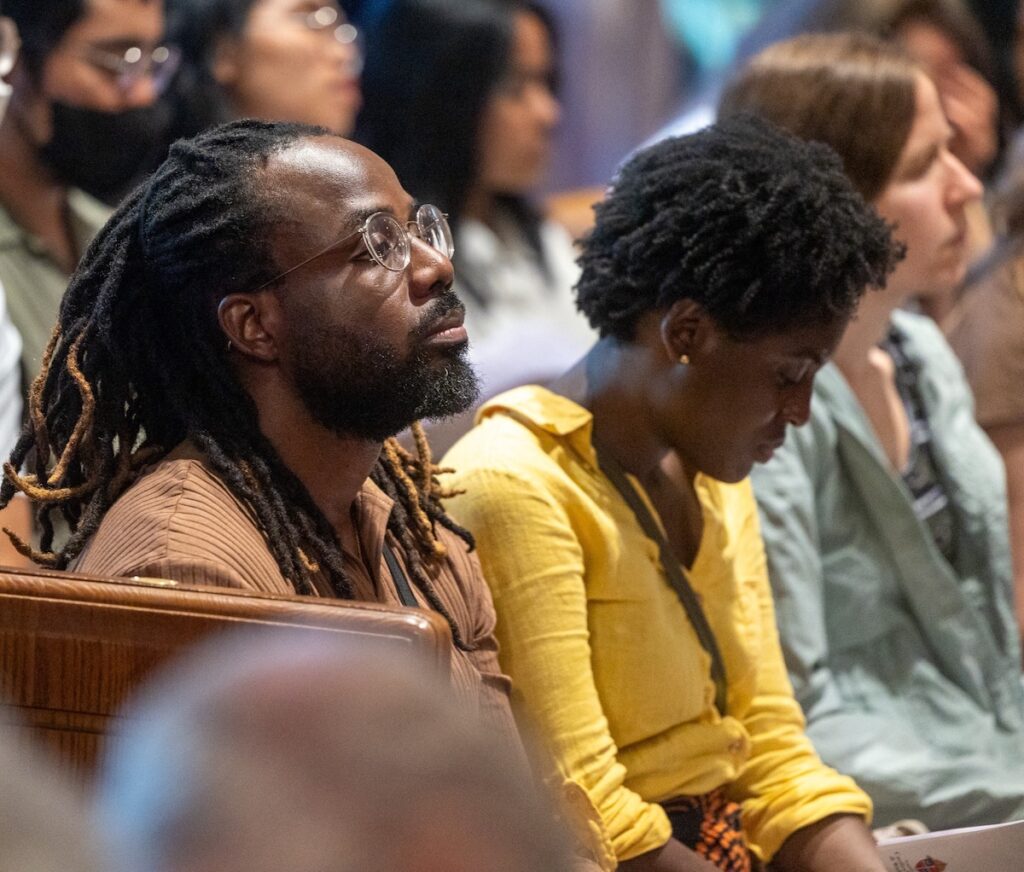
Cardinal McElroy discussed the immigrants in the Archdiocese of Washington and throughout the country that have been impacted by the mass deportation policy.
“Our Catholic community in Washington has witnessed many people of deep faith, integrity and compassion who have been swept up and deported in the crackdown which has been unleashed upon our nation,” he said.
The cardinal thanked parishes, priests and faith leaders in the community for their outreach in response to the crisis, saying “a profound ministry of consolation, justice and support must be the hallmark of our spiritual and pastoral care at this moment.”
Washington’s archbishop also noted the contributions that immigrants in the archdiocese are making to this community and this country, saying, “Your daily witness of faith and family, hard work and sacrifice, compassion and love is a profound reflection of the deepest virtues of our faith and the most noble aspirations of our nation.”
Describing the human impact of the mass deportation policy, the cardinal said, “This assault seeks to make life unbearable for undocumented immigrants. It is willing to tear families apart, separating grieving mothers from their children, and fathers from the sons and daughters who are the center of their lives. It embraces as collateral damage the horrific emotional suffering that is being thrust on children who were born here, but now face the terrible choice of losing their parents or leaving the only country they have ever known.”
Catholic social teaching, he said, states that nations have the right to control their own borders and provide security, and he added that “efforts to secure our borders and deport those undocumented immigrants convicted of serious crimes constitute legitimate national goals.”
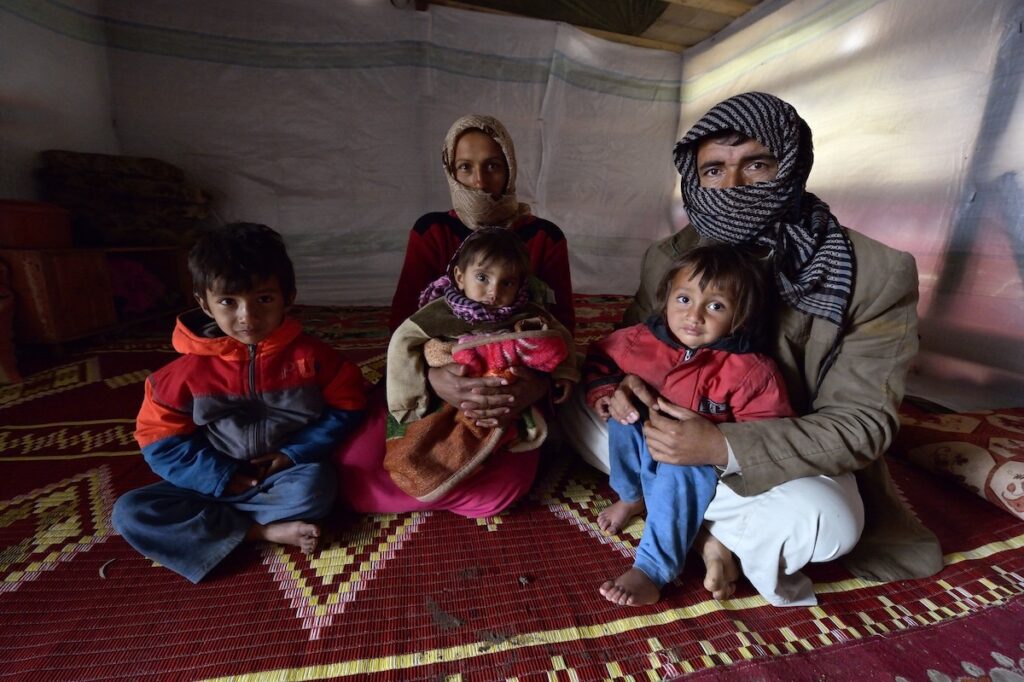
But he added that the scope of the government’s actions, in the archdiocese and across the country, are different.
“For our government is engaged in — by its own admission and by the tumultuous enforcement actions it has launched — a comprehensive campaign to uproot millions of families and hard-working men and women who have come to our country seeking a better life that includes contributing to building up the most important elements of our culture and society. This campaign relies on fear at its core,” Cardinal McElroy said.
Washington’s archbishop noted that the government’s rationale and stated moral foundation for “undertaking such a comprehensive campaign of fear, of uprooting ten million people from their homes and expelling them from our country … is simple and determinative: They broke a law when they entered or chose to stay in the United States.”
But the Parable of the Good Samaritan offers a different lens for looking at the undocumented men and women and children facing expulsion in the mass deportation policy, the cardinal said.
Cardinal McElroy emphasized that “the most striking element of the parable is that the Samaritan was willing to reject the norms of society which said that because of his birth and status he had no obligation to the victim, who was a Jew. The piercing insight and glory of the Samaritan was that he rejected the narrowness and myopia of the law to understand that the victim he was passing by was truly his neighbor and that both God and the moral law obligated him to treat him as neighbor.”
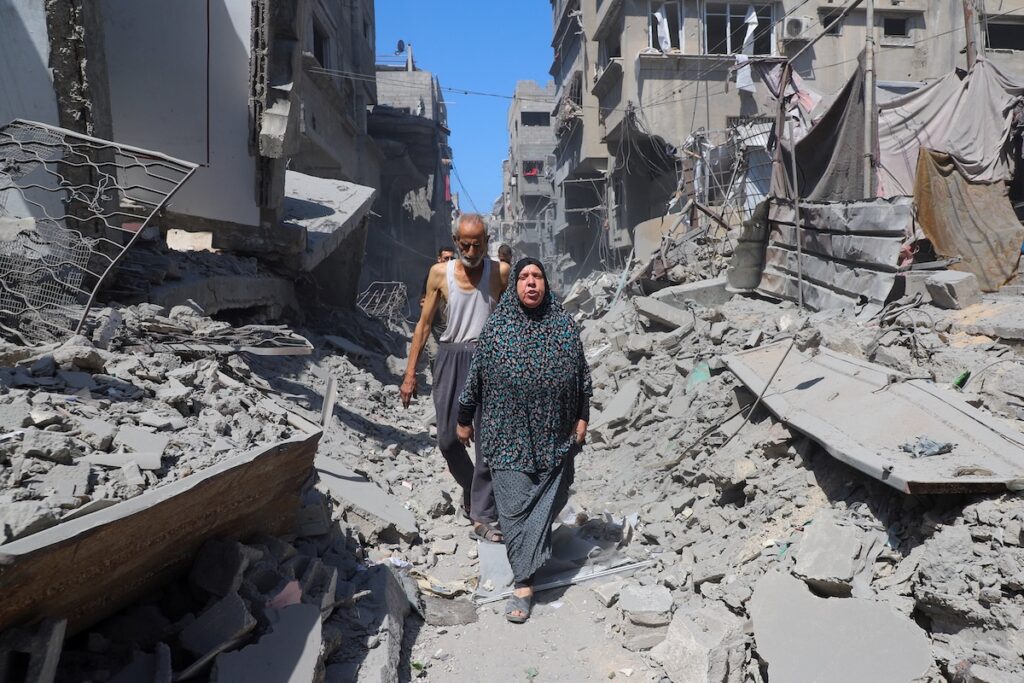
The cardinal emphasized that, “As citizens, we must not be silent as this profound injustice is carried out in our name.”
He underscored that Jesus in the parable of the Good Samaritan rejected indifference, fear and reluctance, and his question about which one — the Samaritan, the priest or the Levite — was a neighbor to the robber’s victim, is also a question for people today, who in considering the plight of the nation’s undocumented immigrants, must ask, “Are they our neighbors?,” and in turn, will they be neighbors to them?
Concluding his homily, Cardinal McElroy said, “In understanding and facing the oppression of undocumented men and women in our midst, we have only one answer: ‘I was, Lord, because I saw in them your face.'”
After the Mass, Oscar Ramos — a parishioner of the Shrine of the Sacred Heart who had brought up the offertory gifts with his wife Ludis and their sons Oscar Jr., who is 13, and Jaziel who is 6 — told Catholic Standard the cardinal’s homily “was amazing. It was very comforting for us.”
He added, “We have to love each other, no matter if you are an immigrant or not. As a neighbor, you have to love each other, as Jesus said.”
Nicole Olea and Mark Zimmermann write for Catholic Standard, the newspaper of the Archdiocese of Washington. This version is a combination of two stories originally published by Catholic Standard and is distributed through a partnership with OSV News.
The full text of Cardinal McElroy’s homily for World Day of Migrants and Refugees can be read here.




